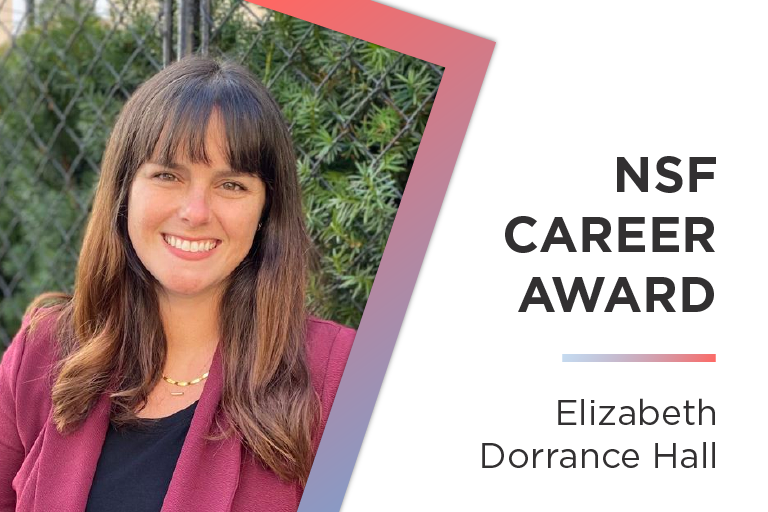Michigan State University researcher receives grant funding from National Science Foundation’s CAREER Program to study how parental messages affect women’s participation in STEM careers.
Assistant Professor Elizabeth Dorrance Hall is known for her research on communication in close interpersonal relationships, particularly among families.
As director of the Family Communication and Relationships Lab at MSU, Dorrance Hall’s research seeks to understand how family communication styles and support can impact truly critical things, like how well young adults do in school, the health of their relationships, and their psychological well-being. She also studies the experiences of women in traditionally male-dominated career fields, and how a person’s feelings of being marginalized, or “left out” by family members, are influenced by what family members say and do.
These topics may be the ingredients for an awkward family dinner, but they are also the ingredients that melt together perfectly in her latest research endeavor — which has just received incredible support from the National Science Foundation’s CAREER Program.
Elizabeth Dorrance Hall receives NSF CAREER Award
The Faculty Early Career Development (CAREER) Program is a prestigious initiative offered by the National Science Foundation (NSF) to recognize and support outstanding early-career faculty who have the potential to become academic leaders in both research and education. The program aims to empower these talented individuals to make significant contributions to their fields, organizations and communities through their work, ultimately creating a strong foundation for continued growth and leadership throughout their careers.
The project, titled “Family Support, Pressure, Disengagement, and Marginalization: Facilitating or Hindering STEM Interest and Career Participation among Diverse Women,” officially began May 1. The $1.3M grant from NSF will support Dorrance Hall’s project for five years, including funding graduate student and post-doc researchers.
“It’s an amazing opportunity to fund multiple studies over several years,” said Dorrance Hall, who proposed four different studies as part of the CAREER project. “An important component of the grant is the education side; when you write the grant, you lay out the research studies. And then a big part of it is how you’re going to use the findings to give back, do outreach and do educational activities.”
Dorrance Hall is excited for the education and outreach component, adding, “It’s a little different than what I normally do. Of course, I do a lot of teaching — which is, you know, sharing research with students. But this is about getting outside of the institution.”
How parents can support girls’ interests and success in STEM
The research component of this project will study how parents communicate with their daughters about careers in science, technology, engineering and math (STEM). Throughout the study, Dorrance Hall’s team will speak with girls from different backgrounds, their parents, and women who currently work in STEM to understand how different types of messages from parents affect female interests and success in those fields.
Dorrance Hall will also create activities to help parents understand how to support their daughters’ interests in those areas. Ultimately, Dorrance Hall wants to help ensure that more girls and women — especially those from underrepresented groups — feel empowered to pursue and succeed in STEM careers.
“We know parental support of STEM interests is really important,” Dorrance Hall said. “It’s a predictor of who’s going to go into STEM and stay in STEM.”
Dorrance Hall notes that the research in this area has mainly been done outside of the communication field. She wants to delve into the various types of support, how it’s communicated and received among families and other ways parents communicate with their daughters about STEM.
“Family Support, Pressure, Disengagement, and Marginalization: Facilitating or Hindering STEM Interest and Career Participation among Diverse Women” will be a collaborative effort between Dorrance Hall’s team at the Family Communication and Relationships Lab and several partners across Michigan State University, including:
- ComArtSci's GEL Lab
- Women in Engineering
- Julian Samora Institute
- MSU Science Festival
- WKAR
- Office of K-12 Outreach
- University Outreach and Engagement
As part of her education and outreach component, Dorrance Hall proposed creating a parent workshop to share some of the findings of the research — a partnership with MSU’s Women in Engineering. The team will also design a game with Casey O’Donnell and the Games for Education and Learning (GEL) Lab.
“The idea of a card game was appealing to me because as a communication researcher, I’m really interested in getting parents and kids talking. And I know that sometimes that can be hard, especially when we’re talking about teenagers,” said Dorrance Hall.
She emphasized that the studies will include Hispanic, Black and white participants, families and parents. The card game will be offered in Spanish and English, featuring depictions of diverse women in different STEM careers.
“I like that part of our game, that there’s this visual component,” she said. “We can use these conversation prompts to help parents, because they want to talk about this stuff, but might not know how to bring it up, or what to say — or what not to say. The card game can help guide some of that.”
Dorrance Hall said first thing’s first: research. Then, they’ll move into designing the activities.
“It’s going to be a really exciting project, and hopefully we’ll be able to connect back throughout the next five years and report on what’s come of it.”
—Jessica Mussell
